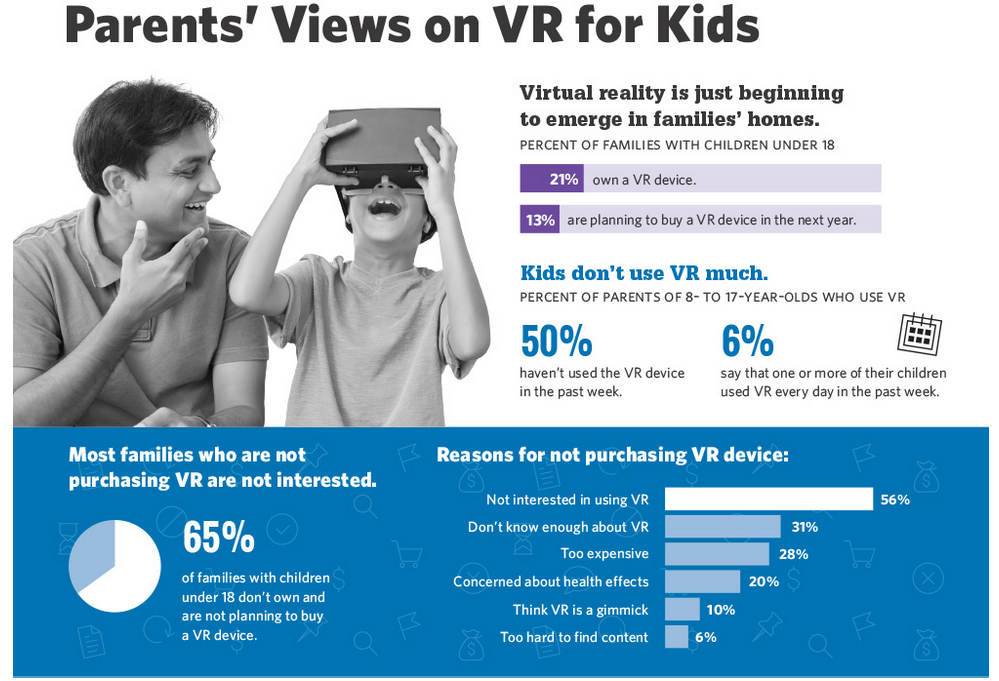Common Sense Looks Into VR

The smarter way to stay on top of broadcasting and cable industry. Sign up below
You are now subscribed
Your newsletter sign-up was successful
Common Sense Media has drilled down on the impact of VR on kids and finds a dual vision of possible pro-social uses and drawbacks from immersion in another world.
That comes in a new report, Virtual Reality 101, that includes a review of the current literature on the impact of virtual reality on children's cognitive development and physical wellbeing and a new survey of parents.
The Consumer Technology Association says that the Augmented Reality/virtual Reality space is positioned for record growth this year, with headsets and glasses selling 4.9 million units in the U.S., a 25%-plus increase over 2017) with revenue of $1.2 billion.
Common Sense said the report highlights opportunities for VR learning, including kids better understanding the perspective of others, quite literally in the VR world, or help decrease bias and encourage empathy--putting a wife abuser in the roll of an abused wife could increase empathy, or a white person in the body of a black person could decrease racial bias.
Common Sense also points out that VR could make it harder for young children to distinguish between virtual and real experiences, but adds that it could help them develop prosocial behaviors by interacting with characters.
Also on the downside of the ledger is the potential for "sensory and vision issues, aggressive behavior, and escapism and distraction."
The revenue from VR are expected to grow from a little over $1 billion in 2018 to over $6 billion in 2021.
The smarter way to stay on top of broadcasting and cable industry. Sign up below
"VR is an exciting new technology that is already showing promise in teaching children important life skills such as empathy and perspective," said Common Sense CEO James P. Steyer of the new report. "There is still a lot to learn about VR, and we have a responsibility to parents and educators to understand how it impacts child development so they can minimize the potentially negative effects while maximizing the positives. As advocates and researchers, we have a unique opportunity to stay on top of this emerging technology and influence its development to help kids learn, achieve better health outcomes, and enhance their entertainment."
Among the survey's top takeaways:
• "One in five U.S. parents today reports living in a household with VR, though many parents (65 percent) say they are not planning to buy a VR device.
• "VR is likely to have powerful effects on children because it can provoke a response to virtual experiences similar to a response to actual experiences.
• "Characters in VR may be especially influential on young children, even more so than characters on TV or computers. This can be good or bad depending on the influence.
• "Overall, 62 percent of parents believe that VR will provide educational experiences for their children, and that number is higher (84 percent) among parents whose children are already using VR.
• "Sixty percent of parents say they are at least "somewhat concerned" that their children will experience negative health effects while using VR.
• "Some parents report that kids are already experiencing health issues, including 13 percent who have bumped into something; eleven percent who have experienced dizziness; ten percent who have had headaches; and eight percent who have had eyestrain."
Contributing editor John Eggerton has been an editor and/or writer on media regulation, legislation and policy for over four decades, including covering the FCC, FTC, Congress, the major media trade associations, and the federal courts. In addition to Multichannel News and Broadcasting + Cable, his work has appeared in Radio World, TV Technology, TV Fax, This Week in Consumer Electronics, Variety and the Encyclopedia Britannica.

